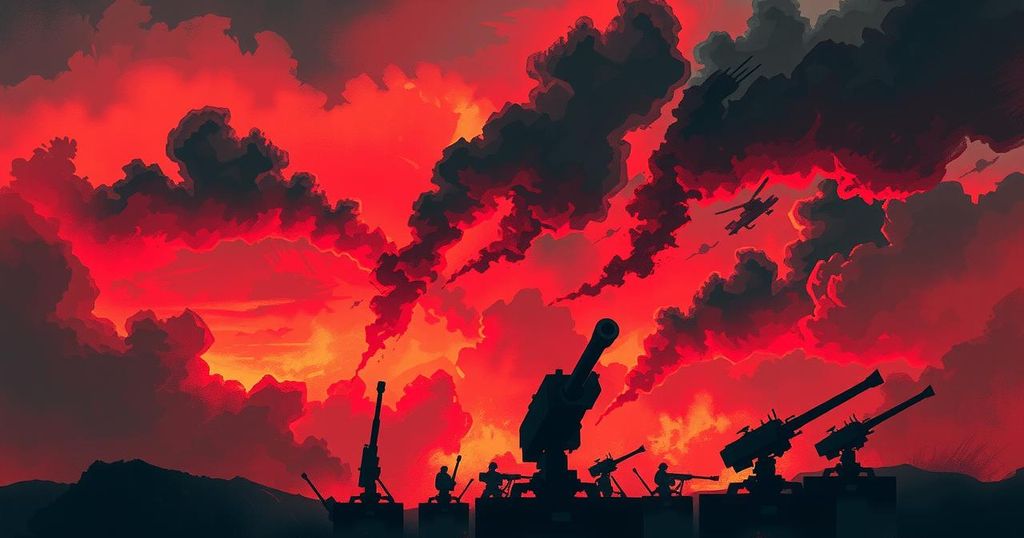Global news
ASIA, BAGHDAD, CHINA, CONFLICT, DONALD TRUMP, EUROPE/ASIA, HEZBOLLAH, IRAN, IRAQ, IRAQI BADR ORGANIZATION, IRAQI NEWS AGENCY, ISRAEL, LEBANON, MEXICO, MIDDLE EAST, MIDDLE EAST AFFAIRS, MILITARY, MILITARY OPERATIONS, MOHAMMED SHIA AL - SUDANI, NEWSWEEK, NORTH AMERICA, NUCLEAR POLICY, RUSSIA, STATE DEPARTMENT, TAMMY BRUCE, TEHRAN, U. S, UNITED STATES, US, WASHINGTON
Isaac Bennett
0 Comments
Iraqi Militia Leader Warns Against U.S.-Iran War Escalation
The leader of the Badr Organization, Hadi al-Amiri, cautioned that a war between the U.S. and Iran could engulf the entire region. Increased U.S.-Iran tensions stem from Iran’s nuclear program and regional military activities. The Iraqi militia, backed by Iran, warns of dire consequences should conflict arise, while Iran reaffirms its cooperative agreements with Iraq amidst threats against U.S. interests.
The leader of the Badr Organization, a significant Iraqi militia backed by Iran, has issued a warning against the potential outbreak of war between the United States and Iran. This caution comes in light of President Donald Trump’s threatening rhetoric aimed at Iran, which has been under scrutiny for its nuclear ambitions. The Badr Organization has a history of involvement in conflicts with U.S. forces in Iraq and emphasizes the risk a wider conflict poses to regional stability.
Tensions between the U.S. and Iran have escalated due to issues surrounding Iran’s nuclear program and its alliances with countries like Russia and China, as well as support for militant factions opposed to U.S. interests and Israel. Moreover, Iran contends that its nuclear activities are strictly for civilian purposes, despite international skepticism.
Hadi al-Amiri, the Secretary-General of the Badr Organization, indicated that any military confrontation would extend beyond the U.S. and Iran, warning that it would engulf the entire region in conflict. Al-Amiri stated, “Any war against Iran will not be a walk in the park, but will ignite the entire region.”
The recent back-and-forth of military threats between the U.S. and Iran has created rising concern within the international community, particularly as the U.S. government seeks to exert pressure on Iran’s influence in the Middle East. In March, Trump took military action against Iranian-affiliated groups such as the Houthis while intensifying sanctions against Iran.
During ongoing discussions of cooperation, Iran’s President Masoud Pezeshkian reaffirmed the commitment to uphold mutual agreements with Iraq, aiming to bolster bilateral relations amid external pressures. Additionally, several Iranian-backed militias have made aggressive declarations against U.S. involvement in Iraq, advocating for the withdrawal of U.S. forces.
As tensions mount between the U.S. and Iran, it is likely that other regional players could become involved, raising the possibility of a broader conflict that could destabilize the Middle East further. This evolving situation necessitates continued monitoring to assess the potential for diplomatic resolutions versus escalating hostilities.
In summary, the increasing tensions between the U.S. and Iran underline the precarious geopolitical landscape of the Middle East. The warnings from Iraqi militia leaders like Hadi al-Amiri reflect the concerns regarding the extensive implications any military confrontation could have on the region. With Iran affirming its commitment to cooperation with Iraq amidst rising threats, the international community remains watchful for developments that could either escalate or de-escalate the situation.
Original Source: www.newsweek.com




Post Comment